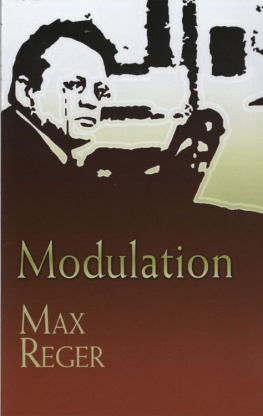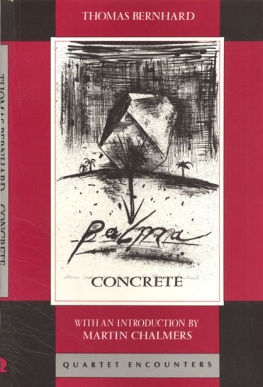Thomas Bernhard
Old Masters
The punishment matches the guilt: to be deprived of all appetite for life, to be brought to the highest degree of weariness of life
KIERKEGAARD
Although I had arranged to meet Reger at the Kunsthistorisches Museum at half-past eleven, I arrived at the agreed spot at half-past ten in order, as I had for some time decided to do, to observe him, for once, from the most ideal angle possible and undisturbed, Atzbacher writes. As he had his morning spot in the so-called Bordone Room, facing Tintoretto's WhiteBearded Man, on the velvet-covered settee on which yesterday, after an explanation of the so-called Tempest Sonata, he continued his lecture to me on the Art of the Fugue, from before Bach to after Schumann, as he put it, and yet was in the mood to talk rather more about Mozart and not about Bach, I had to take up position in the so-called Sebastiano Room; I was compelled therefore, entirely against my inclination, to submit to Titian in order to be able to observe Reger in front of Tintoretto's White-Bearded Man, moreover standing, which was no disadvantage because I prefer standing to sitting, especially when engaged in observing people, and I have all my life been a better observer standing up than sitting down, and as, looking from the Sebastiano Room into the Bordone Room, I eventually, by focusing as hard as I could, was able to see Reger completely in profile, not even impaired by the back-rest of the settee, Reger who, no doubt badly affected by the sudden change in the weather during the preceding night, kept his black hat on his head the whole time, so as I was therefore able to see the whole left side of Reger exposed to me, my plan to observe Reger undisturbed for once had succeeded. As Reger (in an overcoat), supporting himself on a stick wedged between his knees, was totally absorbed in viewing the White-Bearded Man I had not the least fear, while observing Reger, of being discovered by him. The attendant Irrsigler (Jen!), with whom Reger is linked by an acquaintanceship of more than thirty years and with whom I myself have always to this day had good relations (also for over twenty years), had been warned by a hand signal on my part that for once I wished to observe Reger undisturbed, and whenever Irrsigler appeared, with clockwork regularity, he acted as if I were not there at all, just as he acted as if Reger were not there at all, while he, Irrsigler, discharging his duty, subjected the visitors to the gallery, who, incomprehensibly on this free-admission Saturday, were not numerous, to his customary (for anyone who did not know him) disagreeable scrutiny. Irrsigler has that irritating stare which museum attendants employ in order to intimidate the visitors who, as is well known, are endowed with all kinds of bad behaviour; his manner of abruptly and utterly soundlessly appearing round the corner of whatever room in order to inspect it is indeed repulsive to anyone who does not know him; in his grey uniform, badly cut and yet intended for eternity, held together by large black buttons and hanging on his meagre body as if from a coat rack, and with his peaked cap tailored from the same grey cloth, he is more reminiscent of a warder in one of our penal institutions than of a stateemployed guardian of works of art. Ever since I have known him Irrsigler has always been as pale as he now is, even though he is not sick, and Reger has for decades described him as a state corpse on duty at the Kunsthistorisches Museum for over thirty-six years. Reger, who has been coming to the Kunsthistorisches Museum for over thirty-six years, has known Irrsigler from the first day of his employment and maintains an entirely amicable relationship with him. It only required a very small bribe to secure the settee in the Bordone Room forever, Reger told me some years ago. Reger entered into a relationship with Irrsigler which has become a habit for both of them for over thirty years. Whenever Reger, as happens not infrequently, wishes to be alone in his contemplation of Tintoretto's White-Bearded Man, Irrsigler quite simply blocks the Bordone Room to visitors, he quite simply places himself in the doorway and lets no one pass. Reger need only give a hand signal and Irrsigler blocks the Bordone Room, indeed he does not shrink from pushing any visitors already in the Bordone Room out of the Bordone Room, because that is Reger's wish. Irrsigler finished an apprenticeship as a carpenter in Bruck-on-Leitha but gave up carpentry even before qualifying as an assistant carpenter in order to become a policeman. The police, however, turned Irrsigler down because of his physical weakness. An uncle, a brother of his mother, who had been an attendant at the Kunsthistorisches Museum since nineteen twenty-four, got him his post at the Kunsthistorisches Museum, the most underpaid but the most secure, as Irrsigler says. Anyway, Irrsigler had only wanted to join the police because the career of a policeman would, as he believed, solve his clothing problem. To slip all one's life into the same clothes without even having to pay for those clothes out of his own pocket because the state provided them, appeared to him ideal, and his uncle, who got him into the Kunsthistorisches Museum, had thought the same way, and anyway there was no difference in this respect between being employed by the police and being employed by the Kunsthistorisches Museum, admittedly the police paid more and the Kunsthistorisches Museum less, but then service in the Kunsthistorisches Museum could not be compared with service in the police, he, Irrsigler, could not imagine a more responsible but at the same time easier service than in the Kunsthistorisches Museum. In the police, Irrsigler said, a man served day after day in danger of his life; not so if he served at the Kunsthistorisches Museum. As for the monotony of his occupation there was no need to worry, he loved that monotony. Each day he would cover some forty to fifty kilometres, which was more beneficial to his health than, for instance, service in the police, where the main part of the job was sitting on a hard office chair, life-long. He would rather shadow visitors to the museum than normal people, for visitors to the museum were at any rate superior people with an understanding of art. In the course of time he had, he said, acquired such an understanding of art that he would be capable at any time of guiding a conducted tour through the Kunsthistorisches Museum, or certainly through the picture gallery, but he could do without that. Anyway, people do not take in what is said to them, he says. For decades the museum guides have always been saying the same thing, and of course a great deal of nonsense, as Herr Reger says, Irrsigler says to me. The art historians only swamp the visitors with their twaddle, says Irrsigler, who has, over the years, appropriated verbatim many, if not all, of Reger's sentences. Irrsigler is Reger's mouthpiece, nearly everything that Irrsigler says has been said by Reger, for over thirty years Irrsigler has been saying what Reger has said. If I listen attentively I can hear Reger speak through Irrsigler. If we listen to the guides we only ever hear that art twaddle which gets on our nerves, the unbearable art twaddle of the art historians, says Irrsigler, because Reger says so frequently. All these paintings are magnificent, but not a single one is perfect, Irrsigler says after Reger. People only go to the museum because they have been told that a cultured person must go there, and not out of interest, people are not interested in art, at any rate ninety-nine per cent of humanity has no interest whatever in art, as Irrsigler says, quoting Reger word for word. He, Irrsigler, had had a difficult childhood, a mother suffering from cancer and dying when she was only forty-six, and a womanizing and perpetually drunk father. And













